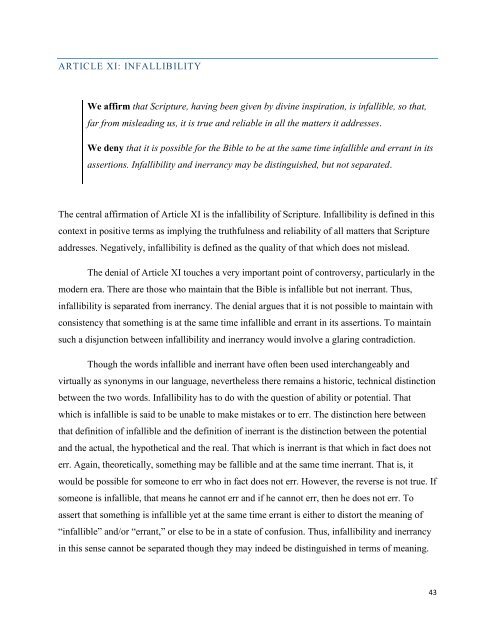Explaining Biblical Inerrancy
Explaining Biblical Inerrancy
Explaining Biblical Inerrancy
Create successful ePaper yourself
Turn your PDF publications into a flip-book with our unique Google optimized e-Paper software.
ARTICLE XI: INFALLIBILITY<br />
We affirm that Scripture, having been given by divine inspiration, is infallible, so that,<br />
far from misleading us, it is true and reliable in all the matters it addresses.<br />
We deny that it is possible for the Bible to be at the same time infallible and errant in its<br />
assertions. Infallibility and inerrancy may be distinguished, but not separated.<br />
The central affirmation of Article XI is the infallibility of Scripture. Infallibility is defined in this<br />
context in positive terms as implying the truthfulness and reliability of all matters that Scripture<br />
addresses. Negatively, infallibility is defined as the quality of that which does not mislead.<br />
The denial of Article XI touches a very important point of controversy, particularly in the<br />
modern era. There are those who maintain that the Bible is infallible but not inerrant. Thus,<br />
infallibility is separated from inerrancy. The denial argues that it is not possible to maintain with<br />
consistency that something is at the same time infallible and errant in its assertions. To maintain<br />
such a disjunction between infallibility and inerrancy would involve a glaring contradiction.<br />
Though the words infallible and inerrant have often been used interchangeably and<br />
virtually as synonyms in our language, nevertheless there remains a historic, technical distinction<br />
between the two words. Infallibility has to do with the question of ability or potential. That<br />
which is infallible is said to be unable to make mistakes or to err. The distinction here between<br />
that definition of infallible and the definition of inerrant is the distinction between the potential<br />
and the actual, the hypothetical and the real. That which is inerrant is that which in fact does not<br />
err. Again, theoretically, something may be fallible and at the same time inerrant. That is, it<br />
would be possible for someone to err who in fact does not err. However, the reverse is not true. If<br />
someone is infallible, that means he cannot err and if he cannot err, then he does not err. To<br />
assert that something is infallible yet at the same time errant is either to distort the meaning of<br />
“infallible” and/or “errant,” or else to be in a state of confusion. Thus, infallibility and inerrancy<br />
in this sense cannot be separated though they may indeed be distinguished in terms of meaning.<br />
43


